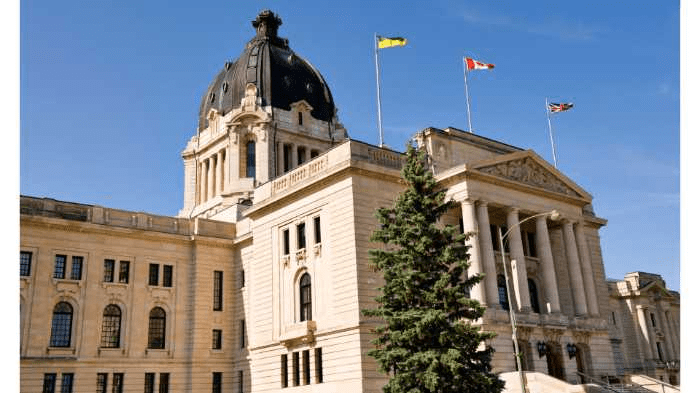
Sustainability and environmental, social, and governance (ESG) considerations are becoming more important for companies all around the world. Here in Saskatchewan, we need to be paying attention to these issues too. In this blog post, we will discuss what sustainability is and why it matters, as well as some of the key ESG factors that companies should be thinking about. We’ll also provide some resources to help you get started on your sustainability journey!
- What are ESG strategies for businesses?
- How can a business go about identifying ESG risks?
- Does ESG apply to private companies in Saskatchewan?
- How can SMEs in Saskatchewan measure their ESG performance?
- Why is ESG important to private equities in Saskatchewan?
- How is Saskatchewan sustainable?
- FAQs
What are ESG strategies for businesses?

ESG (environmental, social, governance) investing is a rapidly growing area of the investment landscape. In response to increasing interest from clients, investors, and employees, an ever-growing number of companies are adopting ESG strategies.
In order to be considered an ESG leader in Saskatchewan, businesses should focus on three key areas: environment, social impact, and governance.
Environmentally, businesses can reduce their carbon footprint and water use, increase energy efficiency, and adopt renewable energy sources. Socially, businesses can invest in employee training and development, support local communities and charitable causes, and encourage diversity and inclusion. Governance-wise, businesses can improve communication with shareholders, increase transparency and accountability, and adopt sustainable business practices.
By implementing ESG strategies, businesses in Saskatchewan can set themselves apart from the competition and position themselves as leaders in the rapidly growing field of responsible investing.
How can a business go about identifying ESG risks?
ESG risks are those factors that can affect the financial performance of a company but are not necessarily reflected in the financial statements. Environmental, social, and governance risks can have a material impact on a company’s bottom line, but they are often not captured in traditional risk assessments. For example, a company might have exposure to environmental risks such as climate change or water scarcity, social risks such as labor disputes or reputational damage, or governance risks such as bribery or corruption.
Identifying Environmental, social, and governance risks is important for any business, but it can be especially challenging for small and medium enterprises (SMEs). In order to effectively identify these types of risks, SMEs need to have a good understanding of the regulatory landscape and the potential impacts of climate change. They also need to engage with their stakeholders, including employees, customers, and suppliers. By taking these steps, SMEs can develop a strong understanding of the ESG risks that they face and take steps to mitigate them.
What are the ESG criteria of institutional investors?
Institutional investors generally invest in three primary types of assets: public equities, fixed-income securities, and alternative investments. Each type of asset has different characteristics, risk profiles, and return potentials. Investors often seek to achieve a diversified mix of these asset types in order to balance risks and opportunities.
The ESG criteria are used by investors as well as financial institutions to evaluate potential investments and make informed decisions about where to allocate capital. The acronym “ESG” stands for environmental, social, and governance. These are the three main pillars that make up the ESG framework. Each pillar of the ESG journey is equally important in assessing the overall sustainability of an investment.
In order to make meaningful progress in addressing global challenges such as climate change and income inequality, it is essential that businesses adopt sustainable practices across all aspects of their operations. Institutional investors play a critical role in promoting sustainable business practices by using their voting power and engagement with companies to encourage them to create ESG policies and adopt sustainable practices.
Find your Province or Territory
Alberta, British Columbia, Manitoba, New Brunswick, Newfoundland and Labrador, Nova Scotia, Ontario, Prince Edward Island, Quebec, Saskatchewan, Northwest Territories, Nunavut, Yukon
Is there a mandatory ESG disclosure required for businesses in Saskatchewan?
No, businesses don’t have to make a mandatory ESG disclosure in Saskatchewan; it’s voluntary. But there’s a growing awareness that it makes good business sense for both companies and consumers to pay attention to ESG commitments.
Does ESG apply to private companies in Saskatchewan?

Saskatchewan is a province in Canada known for its agriculture and resource extraction industries. These industries have a significant impact on the province’s economy, but they also have a significant environmental impact. As a result, many Saskatchewan companies are beginning to adopt an ESG strategy.
The ESG strategy helps companies to reduce their GHG emissions, support social and environmental causes, and improve their governance practices. While these strategies are often associated with public companies, they can also be adopted by small and medium enterprises. By doing so, SMEs can demonstrate their commitment to sustainability and responsible business practices.
You can’t improve what you don’t measure.
Free Verified Carbon Calculators.
Erase Your Carbon Footprint in less than 5 Minutes
Personal Carbon Footprint Calculator
Business Carbon Footprint Calculator
How can SMEs in Saskatchewan measure their ESG performance?
There is no one-size-fits-all answer to this question, as the best way for an SME to measure its ESG performance will vary depending on the specific business and its operating environment. However, there are some general principles that all businesses can follow. First, it is important to create an ESG team within the company, which will be responsible for tracking and reporting on progress in this area. This team should be given clear objectives and tasked with developing a robust reporting system.
Second, Saskatchewan businesses should develop key performance indicators (KPIs) that relate to their specific ESG goals. These KPIs should be tracked on a regular basis, and progress should be reported back to senior management. By following these steps, Saskatchewan SMEs can ensure that they are taking concrete action to measure and improve their ESG performance.
What does the Saskatchewan Securities Commission (SSC) have to do with sustainability?
The Saskatchewan Securities Commission (SSC) is an independent, self-regulatory organization that promotes investor confidence and fair and efficient capital markets in Saskatchewan. The SSC does this by regulating the activities of securities dealers, investment fund managers, and advising firms, as well as monitoring compliance with securities laws.
In addition, the SSC educates investors and provides resources to help them make informed investment decisions. The SSC also maintains a Fair Dealing policy which requires firms to disclose material information about their products and services, and to deal fairly, honestly, and in good faith with their clients.
Lastly, the SSC aims to foster a culture of compliance within the securities industry by working with firms to prevent and address non-compliance. All of these initiatives contribute to the overall sustainability of the securities industry in Saskatchewan, which benefits both investors and industry participants.
Who is responsible for sustainability in a Saskatchewan company?

Sustainability rests on the shoulders of every Saskatchewan company. Businesses need to be mindful of their environmental impact and take steps to protect our province’s natural resources. This includes reducing energy consumption, promoting recycling initiatives, and consciously choosing eco-friendly products and suppliers. It’s up to each and every one of us to do our part in making Saskatchewan a sustainable province. We all have a role to play in preserving our environment for future generations.
Why is ESG important to private equities in Saskatchewan?

ESG is important to private equities in Saskatchewan for a variety of reasons. First and foremost, ESG factors can have a direct impact on a company’s financial and nonfinancial reporting performance. For example, companies that are environmentally friendly or that have strong employee relations tend to be more profitable and efficient than those that do not.
In addition, ESG factors can also provide valuable insights into a company’s management and operations. For instance, companies with poor environmental practices may be more likely to engage in other risky behaviors such as fraud or financial mismanagement.
As a result, ESG data can help private equity firms identify both potential risks and opportunities when assessing investments.
How is Saskatchewan sustainable?

Saskatchewan is working hard to become more sustainable. Already, 25% of the province’s power generation comes from renewable sources. The government has set a target of 50% renewable power generation by 2030. Saskatchewan is also the world’s largest producer of potash, a mineral that is essential for agricultural production. And, thanks to its use of clean coal technology, the province emits 50% less greenhouse gas emissions than its competitors. These efforts are making a difference and positioning Saskatchewan as a leader in sustainable development.
Conclusion
Saskatchewan is a leader in sustainable development thanks to its commitment to renewable energy and clean coal technology. The province is also home to some of the world’s largest producers of potash, making it a key player in global agricultural production. Saskatchewan businesses must take steps to reduce their environmental impact if they want to be responsible corporate citizens and contribute to sustainable growth.
FAQs

Is ESG reporting mandatory in Canada?
At present, there is no law mandating that Canadian companies publicly report their GHG emissions. However, this may soon change. But, companies can still report the negative impacts on the environment because of their operations to show transparency.
Which province in Canada is the most environmentally friendly?
The most environmentally friendly province in Canada is British Columbia. The province has a commitment to protecting its natural environment and has invested heavily in renewable energy sources. As a result, British Columbia has one of the lowest per capita carbon footprints in the country.
What is the most sustainable city in Canada?
The most sustainable city in Canada is Ottawa. It has a very high percentage of green space and is home to many large parks and nature reserves. The city also has a strong public transportation system and is committed to reducing its carbon footprint.
What is the cleanest province in Canada?
The cleanest province in Canada is Alberta. Calgary, the province’s largest city, is consistently ranked as one of the cleanest cities in the world.
Why is Canada’s carbon footprint so high?
One of the reasons why Canada’s carbon footprint is so high is because it is a very industrialized nation. With a large number of factories and power plants, Canada produces a lot of greenhouse gases.
What is Saskatchewan’s carbon footprint?
Saskatchewan has one of the highest per capita emissions of CO2e in the country. In 2018, Saskatchewan’s carbon footprint was 76.4 million tonnes. This is 10% of Canada’s overall emissions. The per capita emissions in Saskatchewan are 65.8 tonnes of CO2e. In 2020, the province emitted 65.9 million tonnes of emissions which is a reduction from previous years. Saskatchewan is working to reduce its emissions by investing in renewable energy, improving energy efficiency, and adopting cleaner technologies.
In conclusion on a sustainable Saskatchewan…
If your business is in Saskatoon, Regina, Prince Albert, Moose Jaw, Swift Current, Yorkton, North Battleford, Warman, Weyburn, Estevan, Martensville, Melfort, La Ronge, Humboldt, Meadow Lake, White City, Nipawin, Melville, Battleford, Kindersley, Tisdale, Moosomin, Unity, Rosetown, Pilot Butte, Assiniboia, Esterhazy, Maple Creek, Pelican Narrows, Outlook or any other part of Saskatchewan, then we encourage you to start reviewing your vulnerabilities when it comes to sustainability.

Dean Emerick is a curator on sustainability issues with ESG The Report, an online resource for SMEs and Investment professionals focusing on ESG principles. Their primary goal is to help middle-market companies automate Impact Reporting with ESG Software. Leveraging the power of AI, machine learning, and AWS to transition to a sustainable business model. Serving clients in the United States, Canada, UK, Europe, and the global community. If you want to get started, don’t forget to Get the Checklist! ✅
